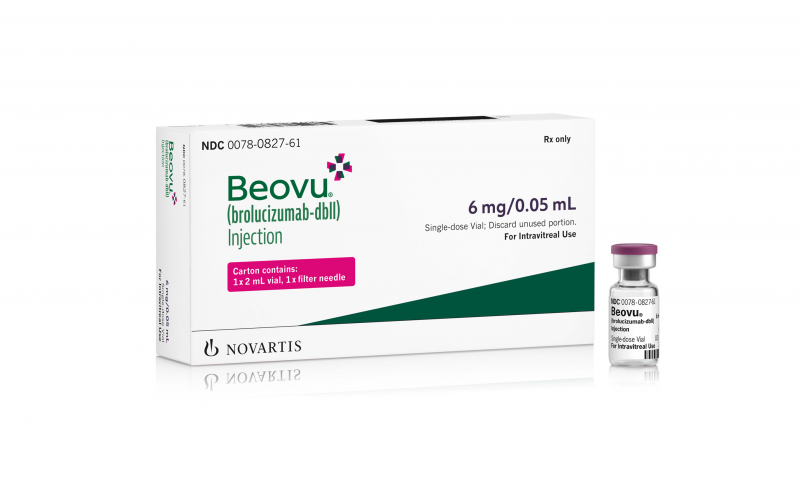New Macular Degeneration Drug BEOVU now available at Michigan Retina-Vitreous Institute
Drug-maker Novartis announced on October 8, 2019 that the U.S. Food and Drug Administration (FDA) approved the new drug application for brolucizumab ophthalmic solution (trade name BEOVU), a new product for treatment of neovascular or “wet” age-related macular degeneration (nAMD).
About neovascular age-related macular degeneration (nAMD or “wet” AMD)
nAMD or “wet” age-related macular degeneration is the leading cause of severe vision loss and legal blindness in people over the age of 65. By 2020, over 1.5 million people in the U.S. are likely to have wet AMD and 20 to 25 million people worldwide will be affected. nAMD occurs when abnormal blood vessels grow beneath the central retina of the eye, called the macula, damaging this area of the eye needed for clear central vision by leaking fluid and disrupting the normal retinal architecture ultimately causing damage to the macula.
nAMD can lead to visual distortion and central blurring which can progress to the complete loss of central vision. This can leave the patient unable to read, write, drive or recognize faces.
Current Treatments
Currently, anti-VEGF (vascular endothelial growth factor) drugs like Lucentis (ranibizumab), Eylea (aflibercept) and Avastin (bevacizumab) are used to treat nAMD. These are administered via injections directly into the eye by a retinal physician typically every 4 to 8 weeks, although treat-and-extend protocols are tried to extend the treatment intervals for as long as the retina remains dry and stable.
About BEOVU (brolucizumab)
Beovu (brolucizumab) is also a VEGF inhibitor, but offers the possibility of less-frequent administration every 8 to 12 weeks between injections, and potentially longer through a treat-and-extend protocol.
Beovu (brolucizumab) is an advanced antibody fragment medication. This small molecule blocks vascular endothelial growth factor A in the eye inhibiting the growth of new blood vessels, improving retinal swelling, and improving vision in patients. Its approval in the U.S. is based on Phase III data from the HAWK and HARRIER trials and is being marketed by Novartis under the trade name BEOVU. In both trials, patients were randomized to either Beovu (brolucizumab) or Eylea (aflibercept.) Following a 3-month loading phase, patients in the Beovu (brolucizumab) groups received further injections every 12 weeks with an option to adjust to every 8 weeks, if needed. Patients in the Eylea (aflibercept) groups were treated every 8 weeks.
Beovu (brolucizumab) was found to be as effective as Eylea (aflibercept) with regard to change in vision up to 48 weeks. Additionally, Beovu (brolucizumab) appeared better in improving central retinal swelling and disease activity.
Who should get BEOVU?
Beovu (brolucizumab) is the next step in the evolution of anti-VEGF medications. It holds the promise of less frequent injections for patients being treated with active nAMD or “wet” age-related macular degeneration. This does not imply that the other anti-VEGF drugs, Lucentis (ranibizumab), Eylea (aflibercept) and Avastin (bevacizumab) are no longer to be used. Many patients have done and will do very well with these medications, maintaining stable vision and control of macular swelling and disease activity. However, for those eyes that have been unable to control macular swelling and disease activity with these medications, or for those eyes that require these medications frequently, Beovu (brolucizumab) may provide them with a more effective and longer-lasting response.
We now have Beovu (brolucizumab) available for use in our office. Insurance coverage is expected to become available in 2020.

